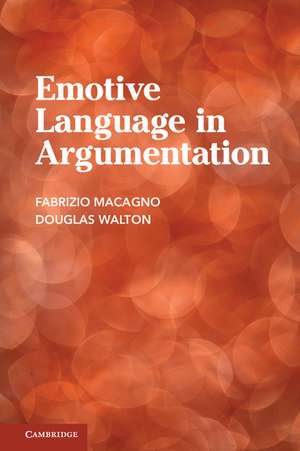Emotive Language in Argumentation
Autor Fabrizio Macagno, Douglas Waltonen Limba Engleză Hardback – 23 feb 2014
Preț: 560.22 lei
Preț vechi: 629.45 lei
-11% Nou
Puncte Express: 840
Preț estimativ în valută:
107.20€ • 114.63$ • 89.38£
107.20€ • 114.63$ • 89.38£
Carte tipărită la comandă
Livrare economică 18 aprilie-02 mai
Preluare comenzi: 021 569.72.76
Specificații
ISBN-13: 9781107035980
ISBN-10: 1107035988
Pagini: 301
Ilustrații: 25 tables
Dimensiuni: 157 x 235 x 20 mm
Greutate: 0.52 kg
Ediția:New.
Editura: Cambridge University Press
Colecția Cambridge University Press
Locul publicării:New York, United States
ISBN-10: 1107035988
Pagini: 301
Ilustrații: 25 tables
Dimensiuni: 157 x 235 x 20 mm
Greutate: 0.52 kg
Ediția:New.
Editura: Cambridge University Press
Colecția Cambridge University Press
Locul publicării:New York, United States
Cuprins
1. When words are emotive; 2. The emotions in our words; 3. When words are reasoning; 4. The acts of defining; 5. What our words hide: presupposition and dark-side commitments; 6. Dialogues and commitments; 7. Metadialogues and redefinitions.
Recenzii
'Very often, words have emotive meanings and present certain values and assumptions as uncontroversial, thus functioning as persuasive (and potentially manipulative) instruments of everyday argumentation. However, an in-depth study of this important and potentially dangerous property of words is still lacking. Macagno and Walton fill this gap with their brilliant and exhaustive study of the relationship between words' meanings and emotions, values, definitions, presuppositions and dialogue commitments.' Manfred Kienpointner, University of Innsbruck
'Emotive language and definitions do not stand in opposition to reasoning; they are involved in virtually all cases of reasoning and argumentation about personal and public life. Macagno and Walton explain why this is so, provide a comprehensive account of how these tools are used, and offer guideposts for argument evaluation that take the role of language seriously.' David Zarefsky, Northwestern University
'Macagno and Walton demonstrate how words can be powerful in evoking emotions and how redefining them can be an act of persuasion. The book is a logico-pragmatic-rhetorical tour de force exploring how emotive meanings are intertwined with definitions, with the dynamics of presupposition, and with implicitness in argumentation. A journey well worth taking for argumentation scholars and linguists interested in evaluative language.' Andrea Rocci, University of Lugano
'This book's title understates its significance. The authors make a compelling case that all language in public argument is emotive language. Richard Weaver's metaphor that language is sermonic is surpassed with a detailed and systematic explanation of how the language of public argument is saturated with values and ideological preferences. Moreover, the authors demonstrate how the tools of logic can be used to understand and evaluate such emotive language. This book is a great leap forward for scholars of logic and argumentation.' Edward Schiappa, Massachusetts Institute of Technology
'Emotive language and definitions do not stand in opposition to reasoning; they are involved in virtually all cases of reasoning and argumentation about personal and public life. Macagno and Walton explain why this is so, provide a comprehensive account of how these tools are used, and offer guideposts for argument evaluation that take the role of language seriously.' David Zarefsky, Northwestern University
'Macagno and Walton demonstrate how words can be powerful in evoking emotions and how redefining them can be an act of persuasion. The book is a logico-pragmatic-rhetorical tour de force exploring how emotive meanings are intertwined with definitions, with the dynamics of presupposition, and with implicitness in argumentation. A journey well worth taking for argumentation scholars and linguists interested in evaluative language.' Andrea Rocci, University of Lugano
'This book's title understates its significance. The authors make a compelling case that all language in public argument is emotive language. Richard Weaver's metaphor that language is sermonic is surpassed with a detailed and systematic explanation of how the language of public argument is saturated with values and ideological preferences. Moreover, the authors demonstrate how the tools of logic can be used to understand and evaluate such emotive language. This book is a great leap forward for scholars of logic and argumentation.' Edward Schiappa, Massachusetts Institute of Technology
Notă biografică
Fabrizio Macagno (Ph.D. Università Cattolica del Sacro Cuore,
Milan, 2008) is a researcher and invited assistant professor at the
Faculdade de Ciências Sociais e Humanas, Universidade Nova de
Lisboa, Portugal. His current research, between the fields of
linguistics and philosophy of language, is focused on the persuasive
use of emotive language and on the dialectical dimension of
discourse implicitness, which he analyzes within the contexts of
legal and political discourse. He applies the theoretical models
developed to the context of education, proposing methods for analyzing classroom discourse and conversation. He is the author of several papers on definition, informal fallacies, argumentation schemes, and dialogue theory published in major international peer-reviewed journals such as Journal of Pragmatics, Intercultural Pragmatics, Argumentation, Philosophy and Rhetoric, Informal Logic, and Pragmatics and Cognition. His most important publications include the books Argumentation Schemes (Cambridge University Press, 2008), Emotive Language in Argumentation (Cambridge University Press, 2014), and Interpreting Straw Man Argumentation (Springer, 2017).
Descriere
This book analyzes the uses and implicit dimensions of emotive language from a pragmatic, dialectical, epistemic and rhetorical perspective.
